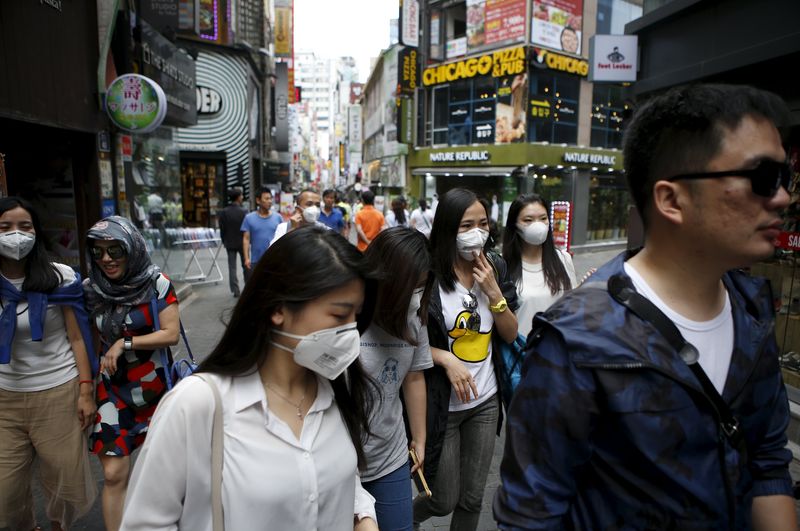(Bloomberg) -- If South Korea’s president can leverage his success fighting the coronavirus to help his party win Wednesday’s elections, it could give him fresh momentum to reshape an economy reeling from the pandemic.
Moon Jae-in’s success in containing one of the first flashpoints of the virus outside China has revived his approval ratings and will likely help his Democratic Party of Korea keep control of the National Assembly. The crisis has also brought Moon’s opposition closer to him in support of economic stimulus, with the only big question now being the amount.
The Bank of Korea has joined the effort, too, by slashing interest rates and pledging to buy bonds.
Just a few months ago, sluggish growth and political scandals threatened Moon with electoral defeat. But the coronavirus has shifted the odds in the president’s favor, offering potential to continue with efforts to reduce inequality by prioritizing wages and tightening rules on expensive housing development once the worst of the virus impact is over.
“A win by the ruling party will reinforce the administration’s faith in those policies,” said Ryoo Jae-woo, an economics professor at Seoul’s Kookmin University. “Moon will keep pushing in the direction of his platform.”
A victory by the opposition United Future Party, on the other hand, could move corporate tax cuts near the top of the economic agenda. It would also essentially make Moon a lame duck president for the rest of his single, five-year term.
That scenario seems unlikely. Despite a history of South Korean election surprises that make predictions tricky, polls released last week showed Moon’s party leading the UFP about two to one, suggesting it will add to the 120 seats it holds in South Korea’s 300-member parliament.
Virus Helps Bury Controversy in South Korea’s Pandemic Election
Before the virus transformed the global landscape, Moon’s track record on the economy was mixed. He was originally elected president on promises to boost the incomes of average Koreans, address rising wealth inequality and curb the influence of chaebol conglomerates.
But the economy is still heavily reliant on the sprawling chaebol controlled by a handful of wealthy families, despite moves to unwind cross-shareholdings. Some of Moon’s key initiatives were also seen to back fire. Double-digit hikes in the minimum wage in 2018 and 2019, for example, ended up triggering layoffs and discouraging employment, so higher wages haven’t translated into faster economic growth, some analysts say.
With the virus now slamming the brakes on global trade, many economists expect South Korea to grow this year at the weakest pace since the Asian financial crisis two decades ago, or even contract.
Bank of Korea’s Lee Sees Virus Outsizing Financial Crisis Impact
Moon has acknowledged that his minimum-wage hikes haven’t been as effective as hoped and backed away from trying another big one this year. He’s likely to pivot more after the election. Instead of focusing on raising wages, he’ll use government hiring as a way to increase aggregate income, according to economist Kim Jung-sik at Seoul’s Yonsei University.
That is likely to sit better with people more concerned about having work than the rate of pay after the virus lockdown.
“He’ll face the question of which is more important -- higher wages or more jobs,” Kim said. “And he’ll probably go with more jobs. But the wage-led growth strategy is still key to his administration’s identity.”
Read More: South Korea’s Moon Vows ‘Endless’ Property Curbs to Cap Prices
In the short-term, what to do on the stimulus front is the big issue in Korea, just as it is everywhere else.
Moon says he wants a second extra budget to provide direct payments to households. He’s already passed one extra budget worth 11.7 trillion won ($9.6 billion) to try to support the health care industry and the jobs market, along with a 100 trillion won loan package to help small businesses and financial markets survive the crisis.
Opposition leader Hwang Kyo-ahn, the former prime minister who heads the UFP, is calling for even bolder stimulus, including 40 trillion won of what he calls coronavirus bonds for the public. He also says he wants to divert 100 trillion won from the existing budget, though the details are vague.
“Regardless of the outcome of the election, there will be more fiscal stimulus to keep the Korean economy afloat,” said Sung Won Sohn, an economist at Loyola Marymount University in Los Angeles. “Since Korea is an export-dependent economy, the global recession will keep Korea’s economic growth near zero in 2020.”
©2020 Bloomberg L.P.
